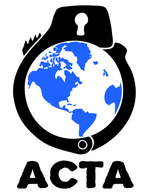Paris, December 14th 2011 – EU Member States –represented by the Council of the EU– adopt today the Anti-Counterfeiting Trade Agreement (ACTA), which aims at imposing new criminal sanctions and privatized online censorship in the name of copyright. The text will now be sent to the European Parliament, which has a chance to oppose it. Citizens must act to ensure their freedoms online are protected by having ACTA finally rejected.
 After the adoption of the legal instrument allowing its signature by the EU Council this afternoon1See the EU Council agenda for today: http://www.consilium.europa.eu/ueDocs/cms_Data/docs/pressData/EN/foraff/126900.pdf
After the adoption of the legal instrument allowing its signature by the EU Council this afternoon1See the EU Council agenda for today: http://www.consilium.europa.eu/ueDocs/cms_Data/docs/pressData/EN/foraff/126900.pdf
“The Council is expected to adopt a decision authorising the signing of an anti-counterfeiting trade agreement (ACTA) between the EU and Australia, Canada, Japan, the Republic of Korea, Mexico, Morocco, New Zealand, Singapore, Switzerland and the United States.”, ACTA is now headed towards the EU Parliament, which will accept or reject it in the next months, after elaborating its report2The International Trade (INTA) Committee of the European Parliament is the main committee working on ACTA. The Legal Affairs (JURI) and Development (DEVE) committees, as well as the Civil Liberties (LIBE), Industry (ITRE) committees will first vote on their opinions. The latter will be sent to INTA to influence its final report. See ACTA’s procedure file: http://www.europarl.europa.eu/oeil/file.jsp?id=5924982.
For EU members states and the Commission, who along with the US and Japan have pushed for ACTA3See the history of ACTA, as told by the US diplomatic cables released by WikiLeaks: http://www.laquadrature.net/en/wikileaks-cables-offer-new-insight-on-the-history-of-acta, ACTA aims to impose measures that they know would be unacceptable if properly debated in democratic arenas. Member States will thus force privatized online censorship in the guise of “cooperation”4In its article 27.3, ACTA calls for “cooperation” between rights-holders and Internet service providers. The very same mechanisms are called by the European Commission “extra-judicial measures” and “alternative to courts”. See: http://www.laquadrature.net/en/acta-updated-analysis-of-the-final-version between the entertainment industry and Internet actors5Internet intermediaries such as access, service or hosting providers.. This transformation of internet actors into a private copyright police and justice will be made possible under the threat of new, harsh criminal sanctions6See La Quadrature du Net’s analysis of Article 23.4 on criminal sanctions: It is intolerable that criminal sanctions are included in a “trade agreement”. Such measures should only be debated in democratic arenas. Moreover, the limit between “aiding” infringements and linking to or indexing information is extremely blurry. Again, see: http://www.laquadrature.net/en/acta-updated-analysis-of-the-final-version
According to ACTA, criminal sanctions must be provided for “commercial scale” infringements. But the notion of commercial scale is excessively broad in scope, including indirect advantage. Again,see: http://www.laquadrature.net/en/acta-updated-analysis-of-the-final-version.
The ratification process in the Parliament is already characterized by the absence of transparency. The EU Parliament has refused to publish its legal services’ full opinion on ACTA, saying that it would “seriously interfere with the complex ratification process”7See the following FFII article: http://acta.ffii.org/?p=904 “according to the EU Parliament: “Important trading partners of the EU, such as the United States, Canada, Japan, Korea and Switzerland are contracting parties to the ACTA agreement. Disclosure of the parts of the legal opinion under consideration dealing with questions 1, 2 and 3 would seriously interfere with the complex ratification procedures of the ACTA agreement and the EU’s relations with the other contracting parties, as it might prejudice the ratification procedures by these countries.””
. Citizens now have a major role to play in making sure Members of the European Parliament face their responsibilities by rejecting this dangerous text.
“Our governments are bypassing democratic processes to impose draconian repressive measures. They know that such measures would be very difficult to obtain through regular legislative process, so they have them imposed through the back door. By privatizing online censorship in the name of copyright, ACTA would have a dreadful impact on our freedoms online, but also on innovation and growth for Internet companies. The European Parliament is our last chance to reject ACTA. We, as citizens, must act now.”, said Jérémie Zimmermann, spokesperson for La Quadrature du Net.
You can add this video to your website, just copy/paste the following HTML snippet :
<iframe src="http://mediakit.laquadrature.net/embed/716?size=medium" style="width: 650px; height: 500px; border: 0; overflow: hidden" scrolling="no" frameborder="0"></iframe>
You can also see share this video on YouTube : http://www.youtube.com/watch?v=citzRjwk-sQ
and Dailymotion : http://www.dailymotion.com/video/xlz8g0_say-no-to-acta_news
References

